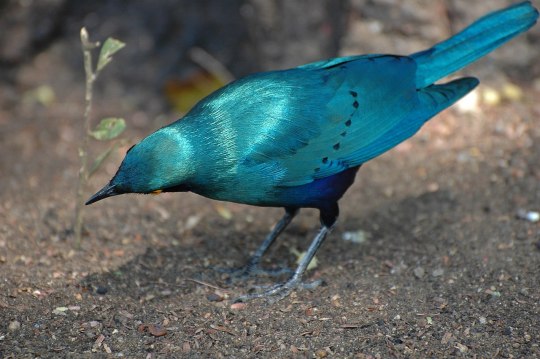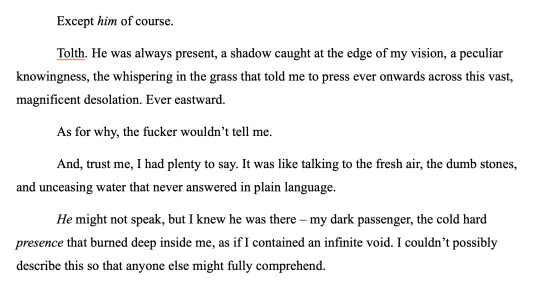#scatterling
Explore tagged Tumblr posts
Text
Well, I offer a retuning of intention, a slightly more sober directive—to be of a place, to labour under a related indebtedness to a stretch of earth that you have not claimed but which has claimed you.
Martin Shaw, Scatterlings
#book quotes#literature#Martin shaw#mythic#mythic literature#books and libraries#books and reading#scatterlings
8 notes
·
View notes
Text
Aaaand now I desperately miss glossy starlings.

Greater Blue-eared Glossy-starling (Lamprotornis chalybaeus), family Sturnidae, Kruger National Park, South Africa
photograph by PanWoyteczek
49K notes
·
View notes
Text
Album Review: Acid Magus - Scatterling Empire (Mongrel Records)
From the first track to the last, Acid Magus deliver an utterly gripping listen. One that showcases their power in unforgettable fashion.
In the liminal space where dreams flirt with reality and light dissolves into shadow, Acid Magus, Pretoria’s own experimental rock mavericks, emerge with Scatterling Empire, a monumental ode to defiance, culture, and the unrelenting spirit of resistance. Set to release on 21st February 2025 via Mongrel Records, the album is an intricate tapestry of sound, philosophy, and storytelling—a…
0 notes
Text

This is one of those novels that you can describe as beautiful. The writing is so evocative and ambient, and the characters, even through all their trials, are written with a calm lyrical hand. The setting of old wine estates and old farm houses, vast plains and high mountains, drew such a good picture of the story and you could see it unfold in such a clear way. The story of this South African family in 1927 was an interesting one, it was an interesting look at the past.
In short, a thoughtful, well researched novel with sprinkles of folklore and a lot of history and character, written like poetry.
#resoketswe manenzhe#scatterlings#literature#african literature#south african literature#zoesreviews#book review#zoengombane
1 note
·
View note
Note
Hi , i love and appreciate the sense of poetry in your writings it catches my attention and excites me to keep reading . Can you please tell me where you get the inspiration from ? Are they books? Perhaps it's your studies ?
Ty and what a lovely question 🩷💋 There are so many things to list such as the obvious nature, music, other people but yeah, there are some specific little things that inspire me!
Baring my soul here really but here we go:
I consider myself an animist so the works of authors who have an animist mindset as well inspire me very much. Such as Martin Shaw (please go read Courting the Wild Twin or Scatterlings) or Peter Grey (Apocalyptic Witchcraft. Incredible.) or David Abram (Spell of the Sensuous 💙) They all write magically and very poetically, I can feel their writing in my body & soul so that's always a plus.
Also most artists who've written for the Dark Mountain Project (their manifesto is insane btw) or poets such as Gary Snyder, Rainer Maria Rilke, T. S. Eliot set me straight when I feel like I'm lacking in words. Also Anaïs Nin! I know some people can't stand her but I think she's brilliant.
I absolutely love depth psychology, Jung opened the doors for me to understand archetypes, myths and recurring themes in stories. His works and the work of Jungian scholars who've studied fairytales, female initiation and the animus are very dear to me. I think without their influence I wouldn't understand what I'm writing or wouldn't be writing at all.
My studies, sometimes, yes! I read a lot of papers on ethnology and anthropology but it's mainly folklore and myths that are my main interest and inspiration... I'm actually in the wrong field but that's ok ;_;
Also your "regular" psychology, I love to study how the human mind works, I'm especially interested in traits that are considered pure evil such as the Dark Triad. I used to be very interested in war history but nowadays I lean more into reading about the psychological impacts of war. A bit gruesome to list these as "inspiration" but it does inspire me to look monstrous things in the eye and not shy away from them. Especially when writing about traumatized military cocks lol 👹🩷
31 notes
·
View notes
Text
Last Monday of the Week 2025-05-05
Getting into the situation
Listening: Bandcamp Friday!
Perennial '65, I cannot thank @kelp-of-discontent for getting me into Perennial enough. I love big loud yelling lyrics and classic rock instruments.
Vestiges of Verumex Visidrome from Gnome, who I really hope I get to see sometime. Thudding, steady progressive rock. It just keeps going
Scatterling Empire from Acid Magus, a ZA band who put down heavy psychedelic metal. For the Lizzard Wizard lovers in your life.
Watching: Night of the Lepus at Bad Movie Night. It turns out that no matter how good you are at miniatures you cannot make rabbits look that scary.
Sinners, literally like an hour ago, with accompanying Q&A with a reviewer. It's great when a movie is two movies that's three movies. This is a story about power and eternity. This is a story about some pretty by the book vampires doing some very off-book things. This is a movie that werewolfbaited me goddammit am I the only one who thought Pearline was going to be a werewolf.
The Big Music Scene is obviously killer but I also adore the undercurrent of power that runs through any moment the vampires get involved in. Look at all this strength! It could be yours, if you just give up everything else..
Reading: Red Mars! Mostly reading this on lunch at work. I love stories about people in close quarters. Some of my most memorable teenage experiences are from Nerd Camp, a public/private pre-university skills development thing I landed up in that had you spending a couple weeks living and working with a hundred other students in your group and like a thousand across the entire program in a non-stop educational drill scenario and that combination of focus and forced familiarity is something I find really compelling.
Playing: Skin Deep, the new Blendo game. If you haven't played a Blendo game you won't know what it means for a game to be Extremely Blendo. There's a reliable but clunky UI, there's a richly decorated environment realized with like four megabytes of memory, there's cats.
The clunkiness of Blendo games is essential to their tactility. If you need to unjam a switch, you need the code for the jammer mounted on the wall. The code is a four-letter code, and you have to punch it in by keying it in on a T9 predictive style keypad with your crosshair and if you fuck it up it buzzes at you and alerts the pirates. If you pick up a gun the only way to know whether it's loaded or if there are bullets in the magazine is to hold it up and check it. When you are covered in trash from crawling through a trash chute you have to hurry around and find a sink to clean off.
Making: Microphone holder for my audio recorder, I was trying to take some field recordings and I wanted some solutions for hooking my mini cardioid onto my recorder. Still working on a good printed shock mount but I'm getting there I think.
A bunch of photography, went to one of the big graveyards. Still sorting through that, and also some of the stuff from the past few weeks. Put some new bugs up on inaturalist.
Tools and Equipment: Budget vibrating toothbrush, a thing I was sold on by @shieldfoss, I've seen these around. The cheap kind that take a AAA and have a conventional head. They're like $15 and I've seen them around but it really is a nice step up without the expense and bulk of the big electric toothbrushes. Gets your teeth squeaky clean and basically fits in a normal toothbrush holder.
3 notes
·
View notes
Text

Christmas Eve farolitos along Canyon Road, Santa Fe, NM. Photo: Gene Peach (Dec 24, 2009) :: [Robert Scott Horton]
* * * *
“A man walks down the street. It's a street in a strange world. Maybe it's the third world. Maybe it's his first time around. He doesn't speak the language. He holds no currency. He is a foreign man. He is surrounded by the sound, sound of cattle in the marketplace, scatterlings and orphanages. He looks around, around he sees angels in the architecture spinning in infinity and he says, "Amen" and "Hallelujah!”
― Paul Simon
14 notes
·
View notes
Text
A man walks down the street
It’s a street in a strange world
Maybe it’s the third world
Maybe it’s his first time around
He doesn’t speak the language
He holds no currency
He is a foreign man
He is surrounded by the sound, the sound
Cattle in the marketplace
Scatterlings and orphanages
He looks around, around
He sees angels in the architecture
Spinning in infinity
He says, “Amen!” and “Hallelujah!”
***
6 notes
·
View notes
Text
During a spate of acapellaphilia in college, I was privileged to hear a demo tape from a defunct group called, I think, Throat Culture or perhaps Bare Essentials. One of their numbers was an all-vocal arrangement of Paul Simon's "Call Me Al" (which for years I thought was titled "Call Me Out," but that's another story entirely.) As you may know, the third and final verse of that well-known piece goes:
He is surrounded by the sound, The sound of cattle in the marketplace Scatterlings and orphanages. He looks around, around He sees angels in the architecture Spinning in infinity He says Amen! and Hallelujah! And if you'll be my bodyguard…
Except, on this particular day, in this particular rendition, the lead singer blew the words. Entirely. He sang,
He is surrounded by the sound, The sound of angels in the architecture [PAUSE] And they were singing a song about… cats! They were singing about swordfish And jellybeans And all kinds of crazy stuff And if you'll be my bodyguard…
The other singers, God bless 'em, never missed a beat, just kept on being the band. They swung with gusto into the finale and finished the piece. Silence. Then the bass could clearly be heard to ask, in a tone of disgust and incredulity:
"JELLYBEANS????"
5 notes
·
View notes
Video
youtube
Johnny Clegg And Savuka - Scatterlings Of Africa (1987)
4 notes
·
View notes
Text

Part of my WiP from Tame the Ocean, book 2 of my Scatterlings of Fate series that will be published by Mirari Press. My publisher wants a prologue that will help link book 1 and 2, and I absolutely suck at prologues, but here we have it.
Garyn I have a real soft spot for. He's somewhat of an outcast and outsider, even among his own people. He didn't ask for any of the shit that happened to him in book 1 (enslavement, being used by evil mages to do their bidding) and now he's walking around carrying an old, forbidden god that has murky motivations.
0 notes
Text
0 notes
Text
Hey I I wanted to show off this song my Anthropology professor showed me cuz it fucking slaps but also I wanted to take this opportunity to remind people that I have a Paleo Playlist and I do take suggestions for songs that remind you of a specific time/event/organism in Earth's past.
1 note
·
View note
Text
Interview: Acid Magus (Video/Audio)
We spoke to bassist Roelof Van Tonder and drummer Jethro Vlag of Acid Magus, discussing the highs and lows of their new album Scatterling Empire's creation, the past few years, the future, and so much more.
In the liminal space where dreams flirt with reality and light dissolves into shadow, Acid Magus, Pretoria’s own experimental rock mavericks, emerge with ‘Scatterling Empire’, a monumental ode to defiance, culture, and the unrelenting spirit of resistance. Set to release on February 21st, 2025 via Mongrel Records, the album is an intricate tapestry of sound, philosophy, and storytelling—a…
0 notes
Text
UMKHONTO weSIZWE part 2

There was another formation, who are the 17 Tonga, who represent the dead, an Initiate would find in the mountains. They are identifiable by the white dust covering their bodies. This dualst is caused from mining lime, using to disinfect the body after mining or fine sculpting clay.





When one "goes home" or indlela, one would happen upon a group of Tonga - usually 7 - who would surround you, at which point, one would do a dance, with gun or spear held aloft or stabbing into the air, pumping ones knees up or stomping ones feet and circling to face each in the circle or rotang. They would then flick a kwagga tail at three different heights of your body (Tonga Stonga), rendering your body impenetrable.



A music video, showing the Tonga Stonga and the journey to indlela, every incheezwa has to make. The dance that they do, is imperative as this dance and the shaking of kwagga tails at the dancer, renders you impenetrable by blade or bullet in fights or clashes. Some people call this dance the Komatipoort:
youtube
An African "goes home" when the Babba of your Nkandla passes away. If you are the eldest son, you would go indlela to register yourself as your household's new head. If your father owned Nguni, it is imperative to "go home" as the indlela Tonga/Tongaan/Tongaati functions as the property office of either the Sovereign Kingdom of eSwatini or Zimbave or of Africa, I'm not sure.
An amaPiano song that refers to "going home":
youtube
GOING HOME, HEKHAYA
The Tonga know each Sovereign Nkosi baKosi (King of a Kingdom), every Nkosi gaKosi (Chief of a territory, granted by Nkosi baNkosi) and Nkosi amaNkosi (the King of Africa or the 7 Sovereign Kingdoms of eSwati, as Africa was known 300 years ago). The Tonga also used to spenza throughout the Kingdom, as the Sizwe guard and so, as a result, see any Nguni, out of place or grazing territory. When they do, they take those Nguni and return them to indlela, until the owner can be notified.





A music video by Johnny Clegg called Scatterlings of Africa, shows the outside regalia of 2 Umkhonto weSizwes tasked with returning Nguni to their rightful owner:
youtube
Johnny Clegg and his Comrade, spenza broe' and esteemed mfetu, who left precious old traditional dances like Jabula, Juluka and Indlela giSpenza Jive nyama bathu kwenza Pondo. Pata Muzi Empaghatin', wesenjan pela.
It is said that the blood of animals or the guilty settlers would be painted on one side of the body, to forcheeza everyone that the 2 Umkhonto weSizwe worked for their Tabalaza today and that the trouble would bother the owner no more. The knop-kierrie is also a sign that they are Umkhonto weSizwes, tasked to walk Nguni home. It also shows the cave in Masinga Valley that Umkhonto weSizwes kotla in, to receive Inkleezi, to demonstrate required movements and to Siko with Umoya. The procedure changed a lot, according to the Inkhoti/Makhoti and his/her dwelling or location, usually the cave, entrances to mines, gulleys and hidden Earth Ghettoes.














Occassionally, they would take them to the owner. Back in the day only Nkosi owned Nguni and only royal daughters were paid labola for. Over time, it developed into a Ibola Lethu circumstance, in which a titled African could take a bride to be's father to watch the Nguni parade on the beach and allow him to choose 3 Nguni of the total labola price. This is how one titled African would entitle another...
0 notes
Text
Johnny Clegg And Savuka - Scatterlings Of Africa (1987)
youtube
0 notes